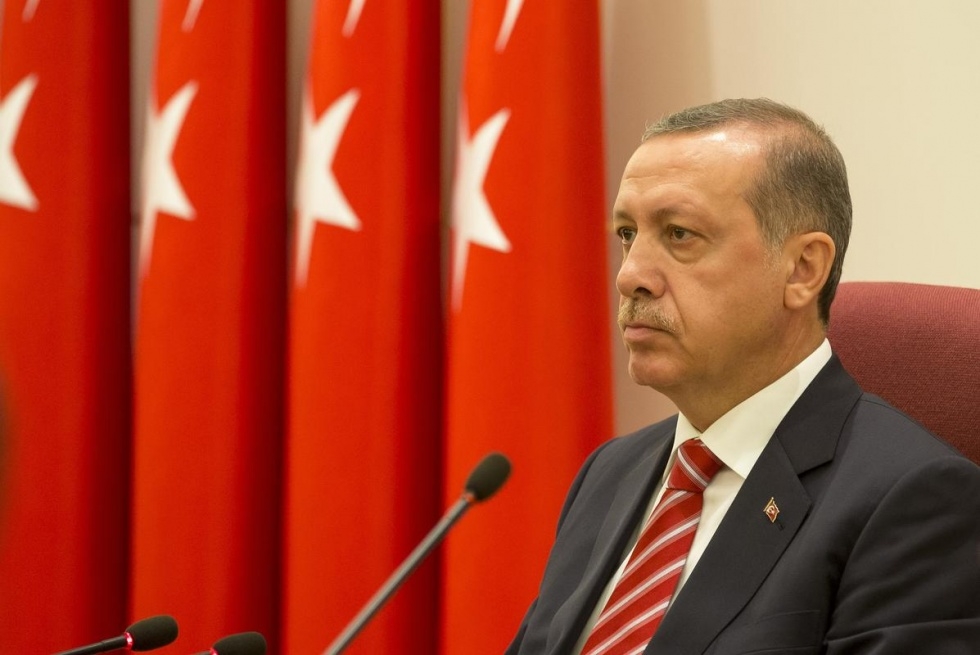EU should threaten Erdogan over human rights

The European Union (EU) must exert its considerable leverage in order to challenge the increasingly autocratic behaviour of Turkey’s first elected president Recep Tayyip Erdogan in the interests of protecting human rights and the rule of law.
Erdogan, who has served as Prime Minister since 2003, won around 52 per cent of the vote in an election on August 10, beating challengers comfortably in the first round to become Turkey’s first elected president. Although he faces parliamentary elections next year that will decide whether his Justice and Development Party (AKP) will gain enough of a majority to amend the constitution, Erdogan has become adept at playing off two admittedly contradictory political traditions.
Immediately after hearing of his victory, he chose to pray at the Eyap Sultan mosque, which served as the traditional site of the coronation ceremony of Ottoman Sultans. This doesn’t seem to have been coincidence. Indeed, Erdogan’s policies and pretensions are self-consciously neo-Ottoman in two respects.
Firstly, in an homage to the Ottoman Caliphate, whose sultan traditionally ruled as the spiritual and political leader of the global Muslim Ummah (or community), he has re-injected religion into Turkish political discourse in a successful bid to rally conservative and rural voters, primarily from Anatolia. On the back of this, Erdogan has won nine successive elections, although a continuously growing economy, vastly reduced inflation rates and lower debt have also played a major role in his electoral victories.
Secondly, Erdogan’s foreign policy has been seen as attempting to create a neo-Ottoman sphere of influence in territories that formerly fell under the dominion of the empire. However, Erdogan has also been sensitive to the political power of the country’s secular (and possibly atheist) founding father Mustafa Kemal Atatürk (1881-1938), who remains an object of veneration and whose portrait still hangs in schools, public offices and private businesses across the country.
Indeed, mimicking Atatürk’s Western-oriented approach, Erdogan has been actively pursuing negotiations for the possibly entry of his country into the EU since 2005. In doing so, he has indicated a desire to carry out reforms that would observe the so-called Copenhagen Criteria of democratic governance and respect for human rights – although for the sake of domestic consumption, as journalist Andrew Finkel notes, he has re-styled them the ‘Ankara Criteria’. These conditions stipulate that, before a state can join the EU, it must demonstrate ‘the stability of institutions guaranteeing democracy, the rule of law, human rights and respect for and protection of minorities’.
However, in contradistinction to Atatürk, who held the rank of general and masterminded the bloody defeat of British imperial forces in 1915-16, Erdogan has shown little patience with the military. August 2011 witnessed what the late journalist Christopher Hitchens described as the ‘liquidation of the… secularist military caste’ after commanders in the Supreme Military Council affirmed the government’s control over the appointment of top-level commanders. Thus, aided by the prospect of EU accession, Turkey has veered away from its 20th century tradition of military coups in 1960, 1971 and 1980.
Yet Erdogan’s actions in office – which have included an assault on freedom of expression in a draft bill on internet law and the harassment and prosecution of journalists and academics - have recently worried European lawmakers with regards to whether Turkey is serious about meeting the Copenhagen Criteria. Fundamentally, Erdogan’s commitment to the rule of law was placed under a harsh spotlight after he removed 20 top prosecutors from their posts in January this year.
Furthermore, during his recent election campaign, Erdogan told a journalist to ‘know your place you shameless militant’, exemplifying the contempt in which this government and many before it have held the concept of journalistic freedom. In addition to this, his Minister for Women and Family Affairs Selma Aliye Kavaf described homosexuality as ‘a biological disorder, a disease,’ in a 2010 interview with the Hürriyet daily news.
The country also has a strange and growing habit of manufacturing conspiracy theories about shadowy influences to explain away its own failings, with Erdogan noting that a recent corruption scandal had ‘international dimensions’. As the New Republic rightly notes, such conspiracy theories ‘pollute’ political debate.
Indeed, for a long time, Islamist extremism in Turkey was explained through such a lens. However, the increasing ruthlessness and strength of Islamic State militants on Turkey’s borders in both Syria and northern Iraq seems to be waking Ankara up to what may turn into a potent threat. Recently, Turkey has cracked down more heavily on the Islamist militants who were freely using Turkish towns as staging and supply posts on their way to fighting the forces of Bashar al-Assad in Syria. It is vital that such action continues, and it is the EU’s responsibility to use its leverage to ensure this.
It should also use its leverage to fight for the values it has enshrined in its Copenhagen Criteria and in the European Convention on Human Rights (ECHR), to which Turkey is a signatory.
After all, we know that Turkey is responsive to this: lobbying by member states helped lead to the dropping of the prosecution of Turkish novelist Orhan Pamuk over his comments recognising the deaths of thirty thousand Kurds and a million Armenians. Pamuk had been charged under Article 301, under which insulting Turkishness was punishable by three years in prison. This law was slightly eased in the aftermath of the controversy although it still remains on the books.
If Erdogan doesn’t make a swift move to tackle problems of governance and intolerance, the EU should take swift action to threaten the ending of the negotiation process for Turkish accession. This may seem like the nuclear option. However, the EU should not be seen to even countenance the entry of states that do not respect the highest standards of transparency, accountability, the freedom of the press and the protection of minorities.
-Benedict Greening is a freelance journalists who contributes to the Quilliam Foundation.
This views expressed in this article belong to the author and do not necessarily reflect the editorial policy of Middle East Eye.
Photo: Turkish Prime Minister Recep Tayyip Erdogan presiding a meeting of the Supreme Military Council in Ankara on August 04, 2014 (AA)
New MEE newsletter: Jerusalem Dispatch
Sign up to get the latest insights and analysis on Israel-Palestine, alongside Turkey Unpacked and other MEE newsletters
Middle East Eye delivers independent and unrivalled coverage and analysis of the Middle East, North Africa and beyond. To learn more about republishing this content and the associated fees, please fill out this form. More about MEE can be found here.


